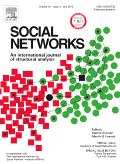
SOCIAL NETWORKS
Scope & Guideline
Unraveling the Fabric of Social Interactions
Introduction
Aims and Scopes
- Social Network Dynamics:
The journal investigates the formation, evolution, and dissolution of social networks, examining how relationships and interactions change over time. - Methodological Innovations:
A significant emphasis is placed on developing and applying new methods for analyzing social networks, including statistical models, machine learning approaches, and experimental designs. - Interdisciplinary Applications:
The journal covers a wide range of applications, from healthcare and education to political science and environmental studies, showcasing how social networks influence various societal issues. - Contextual Influences on Networks:
Research often explores how social, cultural, and economic contexts shape network structures and dynamics, providing insights into issues like social capital and inequality. - Network Interventions and Policies:
The journal publishes studies on interventions aimed at modifying social networks for positive outcomes, particularly in public health, education, and community development.
Trending and Emerging
- Healthcare Networks:
Recent publications emphasize the role of social networks in healthcare, particularly in understanding patient outcomes, health behavior, and community health interventions. - Machine Learning Applications:
The integration of machine learning techniques for predicting network dynamics and analyzing complex data sets is gaining traction, reflecting the journal's commitment to methodological advancement. - Political and Environmental Networks:
There is an emerging focus on the interplay between social networks and political movements, as well as environmental issues, showcasing how network analysis can inform policy and social change. - Youth and Adolescence Studies:
Research on youth networks, particularly concerning mental health, peer influence, and social dynamics in educational settings, is increasingly highlighted, pointing to a growing interest in this demographic. - Network Ecology and Contextual Analysis:
An emerging trend in the journal is the exploration of network ecology, which examines how social networks operate within broader ecological and contextual frameworks, enhancing understanding of relational dynamics.
Declining or Waning
- Traditional Social Capital Concepts:
There is a noticeable decline in papers focused on traditional definitions of social capital, as the field increasingly embraces more complex and dynamic interpretations of social ties. - Static Network Analysis:
The reliance on static models for network analysis has decreased, with fewer studies focusing solely on snapshot analyses, as researchers now favor longitudinal and dynamic approaches. - Homophily in Simple Terms:
Research centered on basic homophily concepts is less prevalent, as newer studies delve into more intricate factors influencing social ties, such as contextual and situational variables. - Causal Inference in Isolation:
While causal inference remains important, there is a waning interest in analyzing causation in isolation without considering the broader network dynamics and interactions. - Basic Network Metrics:
The focus on traditional network metrics (e.g., degree centrality) appears to be declining in favor of more nuanced measures that account for network context and complexity.
Similar Journals
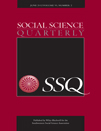
SOCIAL SCIENCE QUARTERLY
Connecting Ideas to Influence Global PolicySOCIAL SCIENCE QUARTERLY, published by WILEY, is a prestigious journal that plays a crucial role in advancing the field of social sciences. With an impressive impact factor and recognized as a Q1 journal in the field for 2023, it stands out for its rigorous peer-reviewed articles that span an array of topics in general social sciences. The journal's comprehensive scope accommodates diverse methodologies and perspectives, making it an essential resource for researchers, professionals, and students alike. Although it does not offer Open Access options, the journal maintains a strong presence in the academic community, ranked #67 out of 275 in its category by Scopus, highlighting its esteemed reputation. The publication has been a vital contributor to social science discourse since its inception in 1970, providing insights that influence policy and practice globally. With its address located in the United Kingdom, SOCIAL SCIENCE QUARTERLY continues to excel in delivering valuable scholarship that shapes the understanding of social phenomena.

EPJ Data Science
Transforming Data into Knowledge for a Global AudienceEPJ Data Science is a prominent open-access journal affiliated with SPRINGER, dedicated to disseminating high-quality research in the fields of Computational Mathematics, Computer Science Applications, and Modeling and Simulation. Established in 2012, this journal provides a scholarly platform for innovative ideas and methodologies aimed at advancing data science, bridging gaps between theoretical foundations and practical applications. With impressive rankings, including Q1 in Modeling and Simulation and Q2 in both Computational Mathematics and Computer Science Applications as of 2023, EPJ Data Science is recognized for its significant contributions to academia, evidenced by its strong performance in Scopus rankings. The journal is committed to open access, ensuring that research is accessible to a global audience, thereby enhancing collaboration and interdisciplinary communication. Located at One New York Plaza, Suite 4600, New York, NY 10004, United States, it serves as a hub for researchers, professionals, and students eager to share and explore pioneering developments in data science.

SOCIOLOGICAL PERSPECTIVES
Connecting theory and practice in the evolving landscape of sociology.Sociological Perspectives is a premier academic journal published by SAGE Publications Inc that serves as a vital platform for the dissemination of high-quality research in the fields of sociology and political science. Established in 1958, the journal has become a crucial resource for scholars, professionals, and students alike, actively contributing to the evolution of sociological thought and understanding. With its robust Q1 quartile ranking in both Sociology and Political Science as of 2023, it stands at the forefront of academic discourse, fostering interdisciplinary dialogue and innovative perspectives. Dedicated to ensuring academic rigor and relevance, the journal prioritizes articles that address contemporary social issues, theoretical advancements, and methodological innovations. While currently not offering Open Access, it remains accessible through various institutional subscriptions, enriching the academic community with insights that challenge conventional paradigms and encourage thoughtful engagement with emerging social phenomena. Situated in the heart of the United States, specifically at 2455 Teller Rd, Thousand Oaks, CA 91320, Sociological Perspectives continues to shape the future of sociological inquiry and influence policy and practice.
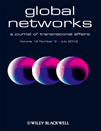
GLOBAL NETWORKS-A JOURNAL OF TRANSNATIONAL AFFAIRS
Bridging Disciplines for Global InsightsGLOBAL NETWORKS - A JOURNAL OF TRANSNATIONAL AFFAIRS, published by Wiley, is a premier platform for scholars and practitioners engaged in the exploration of transnational issues within the social sciences. Since its inception in 2001, this esteemed journal has contributed significantly to our understanding of global networks and their implications for social change, cultural dynamics, and political developments. With an impressive Q1 ranking in Social Sciences (miscellaneous) in 2023, it establishes itself as a pivotal resource for interdisciplinary research, offering insights into the complexities of globalization. Although it does not operate under an open-access model, the journal remains widely accessible through institutional subscriptions, facilitating broad dissemination of high-quality research findings. Researchers, professionals, and students alike are encouraged to submit their work to contribute to this vibrant field of study and join the ongoing dialogue around transnational affairs.

SOCIOLOGIA
Contributing to the understanding of political structures.SOCIOLOGIA, the esteemed journal published by the Institute of Sociology, Slovak Academy of Sciences, serves as a vital platform for advancing knowledge and discourse in the fields of Sociology and Political Science. With an ISSN of 0049-1225 and E-ISSN 1336-8613, this journal has made a significant impact since its inception, now holding a respectable Q3 ranking in the 2023 category quartiles. Its Scopus ranking at #733 out of 1466 in Social Sciences underscores its academic relevance and contributions to the discipline, reaching the 50th percentile among comparable publications. Though it does not offer Open Access, SOCIOLOGIA is dedicated to publishing high-quality, peer-reviewed research that explores social phenomena and political structures with a focus on the Central European context. Researchers, professionals, and students keen on understanding social dynamics will find valuable insights and innovative research within its pages. The journal’s address is Klemensova 19, Bratislava 81364, Slovakia, where it fosters scholarly communication and a deeper exploration of societal issues.

Insan & Toplum-The Journal of Humanity & Society
Empowering voices in the pursuit of understanding humanity.Insan & Toplum - The Journal of Humanity & Society, published by ILEM, is a prominent open access journal dedicated to advancing the fields of social sciences and humanities. Since its inception in 2011, this journal has provided a platform for interdisciplinary research that addresses critical social issues, cultural dynamics, and philosophical inquiries, fostering a rich dialogue among scholars, practitioners, and students worldwide. The journal aims to disseminate high-quality research findings and innovative perspectives that reflect the complexities of human society, facilitating a deeper understanding of contemporary challenges. With its commitment to open access, Insan & Toplum ensures that knowledge is freely available to all, thus promoting wider engagement and discourse in its areas of focus. Featured on various academic databases, this journal is recognized for its scholarly contributions and continues to play an essential role in enriching the dialogue in the humanities and social sciences.

Applied Network Science
Advancing interdisciplinary connections in network science.Applied Network Science is a premier open access journal published by SpringerNature that has been a vital resource in the fields of computational mathematics and computer networks since its inception in 2016. With an impressive Q1 ranking in Multidisciplinary fields and Q2 rankings in both Computational Mathematics and Computer Networks and Communications, it distinguishes itself as a significant contributor to interdisciplinary research efforts. The journal fosters innovative methodologies and applications within network science, making it a crucial platform for researchers, professionals, and students alike. With an E-ISSN of 2364-8228 and a commendable standing in global rankings, it supports a broad audience through its commitment to open access, ensuring that groundbreaking research is readily available. Located in Switzerland, Applied Network Science continues to shape the landscape of network research and communication, making substantial impacts across various domains.

JOURNALS OF GERONTOLOGY SERIES B-PSYCHOLOGICAL SCIENCES AND SOCIAL SCIENCES
Bridging Psychological Sciences and Aging StudiesJOURNALS OF GERONTOLOGY SERIES B: PSYCHOLOGICAL SCIENCES AND SOCIAL SCIENCES, published by Oxford University Press Inc, stands as a premier scholarly outlet dedicated to the interdisciplinary study of aging, psychological sciences, and social relations. With a notable E-ISSN of 1758-5368 and a track record from 1995 to 2024, this journal has firmly established itself within the top quartile (Q1) across multiple domains including Clinical Psychology, Geriatrics, Gerontology, and Social Psychology. Its rigorous standards propel significant research that contributes to understanding the complexities of aging in contemporary society. Researchers and professionals engaged in these fields benefit from its high-impact publications, underscored by impressive rankings—such as 6th in Geriatrics and Gerontology—positioning it amongst the leading journals globally. While there are currently no Open Access options available, the journal remains a vital resource for advancing knowledge on life-span and life-course studies, ensuring that critical insights reach its dedicated audience of scholars and practitioners.
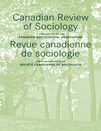
Canadian Review of Sociology-Revue Canadienne de Sociologie
Pioneering Research in Arts and Humanities.Canadian Review of Sociology-Revue Canadienne de Sociologie is a prestigious journal tailored for sociologists and social scientists, published by WILEY. Since its inception in 1964, this esteemed journal has served as a critical platform for the dissemination of high-quality research in both the arts and humanities and broader social sciences, holding a commendable Q1 ranking in Arts and Humanities and Q2 ranking in Social Sciences as of 2023. With an impressive Scopus percentile ranking—78th in Arts and Humanities and 73rd in General Social Sciences—the journal underscores its influence and relevance in contemporary sociological discourse. Researchers and practitioners alike can expect rigorous peer-reviewed articles that contribute to theoretical and empirical debates, as well as discussions on pressing societal issues. While currently not open access, the journal continues to be integral for academic institutions and researchers keen on exploring the intricacies of sociological phenomena across generational and cross-cultural lines, with converged years extending to 2024. Addressed from Hoboken, NJ, the journal not only enriches the academic landscape but also cultivates a global community of sociologists committed to advancing knowledge.
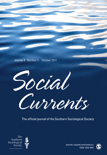
Social Currents
Connecting Research with Real-World ImpactSocial Currents, published by SAGE Publications Inc, is a leading journal in the field of social sciences, specifically categorized within the top-tier Q1 rank as of 2023. With a strong impact factor and a Scopus rank of 87 out of 275, it continues to serve as a vital platform for innovative research and theoretical exploration, positioning itself within the general social sciences while achieving a noteworthy 68th percentile ranking. Since its inception in 2014, Social Currents has aimed to address pressing social issues and present empirical studies that inform both academia and real-world applications, making it an essential resource for researchers, professionals, and students alike. Although it operates under a subscription model, the journal promotes enlightening discussions in diverse areas of social inquiry, encouraging interdisciplinary collaboration and critical engagement with contemporary societal challenges. The journal resides in Thousand Oaks, California, showcasing its commitment to advancing the social sciences landscape through rigorous scholarship and thought-provoking discourse.